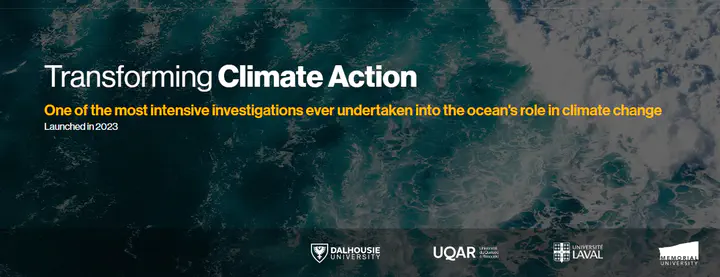Transforming Climate Action research program

Dalhousie University’s Ocean Frontier Institute launched the Transforming Climate Action (TCA) research program in 2023. Philippe Mongeon, one of the leads of Cluster 3.2, and members of the QSSLab will be involved in four work packages, in collaboration with Dalhousie’s Faculty of Computer Science and the Université du Québec à Rimouski.
Work Package 1: Oceans and climate: identifying knowledge and its structure
This work package has two main objectives: to identify scholarly literature on the role of oceans in relation to climate and to analyze the structure and evolution of this research over time using research clusters. It aims to build a global overview of ocean-climate research, supporting both internal projects and informing broader climate policy, like the IPCC reports. Through hierarchical clustering and machine learning, the project will classify knowledge within this corpus, creating tools for future research. Collaboration between Dalhousie University’s Information Science and Computer Science faculties will help ensure the development of a robust knowledge navigation and classification system.
Work Package 2: The evolution of scholarly and public attention toward ocean-climate research
This work package builds on WP1 by examining how ocean-climate research is mobilized across different platforms, including scientific literature, social media, news, policy, and educational materials. Its aim is to determine who engages with this knowledge, the contexts of its citations, and how different geographical or topical clusters generate attention. By mapping knowledge flows, this study will identify which research is visible to key organizations like NGOs and explore how knowledge is disseminated across different audiences. The project will also develop visualization tools to track the movement of knowledge and provide insights into how external events, such as COVID-19, affect knowledge structures, feeding into WP3’s analysis of the drivers of knowledge dissemination.
Work Package 3: The shaping of the ocean-climate research landscape
Work Package 3 focuses on understanding the evolution of ocean-climate research by analyzing knowledge flows over time, using bibliometrics and generative AI. It aims to identify how world events, political actions, and social shifts impact the production and dissemination of research, while also exploring hidden causalities in the knowledge landscape. The project will develop tools to assess gaps in the current knowledge base, predict future research directions, and generate targeted actions to address under-explored areas, with an emphasis on equity and inclusion. Generative AI will also be leveraged to hypothesize future knowledge flows, shape research initiatives, and support multi-language accessibility.
Work Package 4: Mapping curriculum and the scientific landscape
This work package builds on previous efforts to connect ocean and climate science with educational syllabi, focusing on Atlantic Canadian secondary and post-secondary educators. The project aims to analyze the gap between scientific literature and its representation in regional curricula, understand who is and isn’t represented in the scientific works used in education, and develop tools that help educators access relevant research. Through bibliometric analysis and information science methodologies, the project seeks to empower educators to effectively teach ocean-climate science, with particular emphasis on marginalized communities. Collaboration between Dalhousie University and UQAR will ensure interdisciplinary expertise, community partnerships, and the development of participatory, user-friendly tools.
To learn more about different research clusters within TCA and the program’s expected impact, visit the Ocean Frontier Institutes’ website.